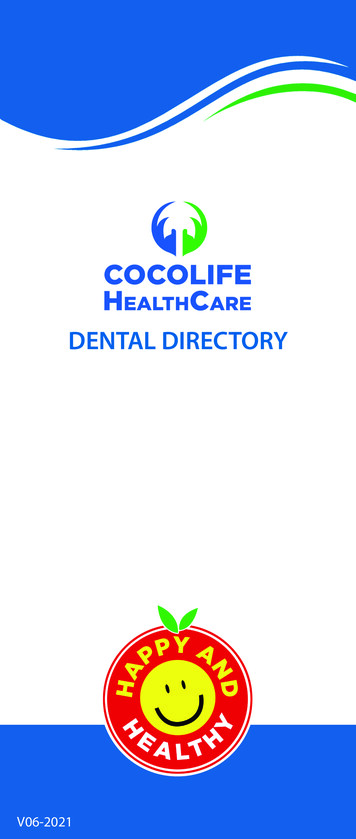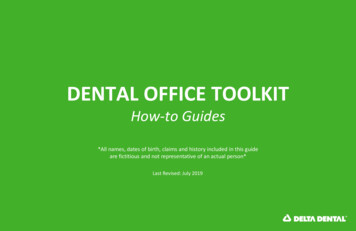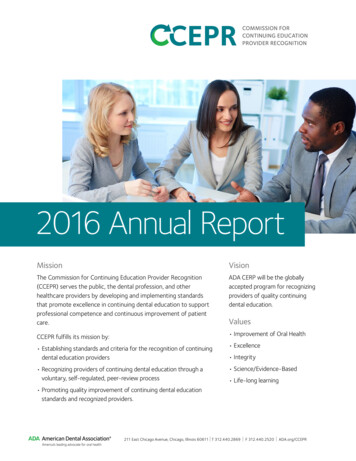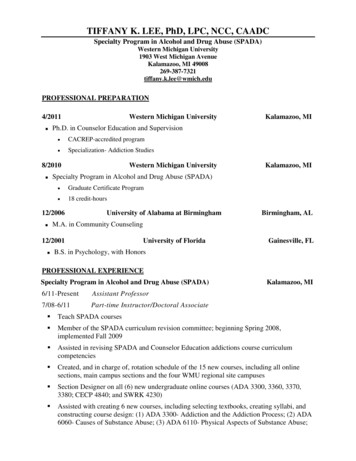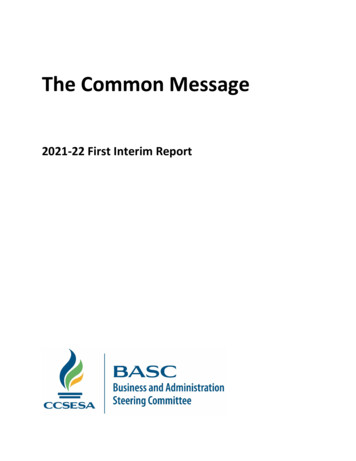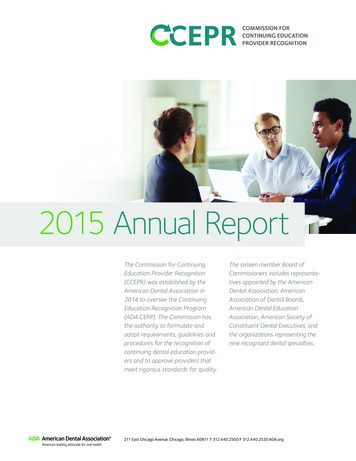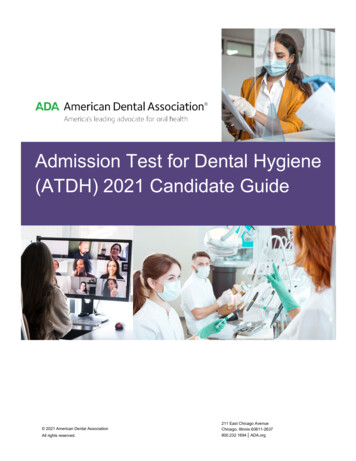
Transcription
Admission Test for Dental Hygiene(ATDH) 2021 Candidate Guide 2021 American Dental AssociationAll rights reserved.211 East Chicago AvenueChicago, Illinois 60611-2637800.232.1694 ADA.org
IMPORTANT NOTE: COVID-19 continues to have an impact on examination programs implemented by DTS.Candidates testing in 2021 should regularly monitor the DTS COVID-19 update document, posted on the ExaminationProgram website, for its potential impact on the Examination Program.You are required to read this document before you apply to take the examination.At the time of application, you will be required to confirm that you have read this document, understood its contents,and agree to the policies and procedures contained herein.Changes to the Admission Test for Dental Hygiene (ATDH) Program might occur after publication of this Guide andwill be posted at www.ada.org/atdh. You will be subject to the policies and procedures currently in effect at the timeof your test administration.ATDH Guide 2021 American Dental AssociationAll Rights Reserved.
TABLE OF CONTENTSOVERVIEW3About this GuidePurpose of the ExaminationEthical ConductEXAMINATION CONTENT AND PREPARATION MATERIALS4Examination Content and SpecificationsScope of the ExaminationConfidentiality of Examination MaterialsExamination PreparationPractice QuestionsSCORING AND RESULTS9Scoring of ExaminationResults ReportsResults AuditsFEES, APPLICATION AND TEST ADMINISTRATION10Examination FeesRescheduling FeesPartial Fee WaiverAdministration DatesRetesting PolicyApply to TestAdministration Vendor Test Center ProceduresAdministration ScheduleReschedule or Cancel a Testing AppointmentNo Show PolicyEmergencies on the Day of a Testing AppointmentTesting Problems on the Day of a Testing AppointmentTesting AccommodationsUnacceptable Forms of DocumentationEXAMINATION REGULATIONS AND RULES OF CONDUCTRules of ConductPrivacy and SecurityExamination MisconductIrregularities and AppealsArbitration RequirementATDH Guide 2021 American Dental AssociationAll Rights Reserved.16
OVERVIEWABOUT THIS GUIDEThis document is the official candidate guide to policies and procedures for the Admission Test for DentalHygiene (“ATDH” or the “Examination”). It provides information such as application and testing procedures,examination content, the consequences of rules violations, and scoring. The current governing body of theATDH is the Admission Test for Dental Hygiene Steering Committee (“ATDH Steering Committee” or “GoverningBody”). The ATDH is implemented by the Department of Testing Services (“DTS”), which is a shared service ofthe American Dental Association. Examinations are administered by Prometric (“Prometric” or “AdministrationVendor”). Collectively, the Governing Body, DTS, and the set of activities, policies, and procedures occurring insupport of this examination are referred to as the “ATDH Program” or simply the “Examination Program.”PURPOSE OF THE EXAMINATIONThe ATDH is intended for candidates who are pursuing a career in dental hygiene and are currently seekingadmission into a dental hygiene education program in the United States. The ATDH is designed to fairly andaccurately understand candidate skill levels, and candidate readiness to benefit from an educational program indental hygiene. Dental hygiene programs use information concerning candidates’ ATDH performance to informadmissions decisions.ATDH results are just one factor considered in evaluating applicant admission potential. The relative importanceof each factor in the admission process is determined by each dental hygiene program.ETHICAL CONDUCTOral health care professionals play an important role in society by providing services that contribute to the healthand well-being of individuals and their communities. In light of this responsibility, oral health care professionalsmust behave ethically at all times. This obligation begins at the time of application to school and continuesthrough the educational process, the licensure process, and the entirety of professional practice.Members of the dental hygiene profession voluntarily abide by the ADHA Code of Ethics and Code of ProfessionalConduct, in the interest of protecting patients and maintaining the trust of society. The ADHA Code of Ethics isfound at this link: https://www.adha.org/resources-docs/ADHA Code of Ethics.pdf.Applicants are expected to abide by these ethical standards and to read, understand, and comply with theexamination regulations and rules of conduct guiding this examination. The obligation to abide by the ethicalstandards of the profession includes a commitment to honesty, truthfulness, full disclosure, accuracy, fairness,and integrity in completing the examination application, during the examination process itself, and in applying forlicensure.Behavior constituting misconduct or irregularity in the examination process is a very serious matter. Violation ofthe rules of conduct or examination regulations may result in civil liability, voiding of examination results, retestpenalties, and/or other appropriate penalties.The Examination Program Governing Body, dental and dental hygiene boards, and the profession expect strongethical behavior from all candidates. The Governing Body annually publishes policies and procedures concerningmisconduct and irregularities in the application and examination process. This information is available in latersections of this document. The Governing Body expects all candidates to carefully read and understand thisinformation and their obligations as candidates for this examination.3ATDH Guide 2021 American Dental AssociationAll Rights Reserved.
EXAMINATION CONTENT AND PREPARATION MATERIALSEXAMINATION CONTENT AND SPECIFICATIONSThe ATDH is composed of multiple-choice test questions (items) presented in the English language. Theexamination consists of six sections: Reading Comprehension, Language Usage, Quantitative Reasoning,Perceptual Ability, Biology, and General Chemistry. Both the U.S. customary system of measurement and themetric system (Imperial System, International System) may be used. Additional information on test contentis provided below.SCOPE OF THE EXAMINATIONReading Comprehension (40 items). The reading comprehension section of the ATDH assesses thecandidate’s ability to read, understand, and analyze basic scientific information. The section consists ofquestions pertaining to reading passages on various scientific topics. Prior familiarity with the specific sciencetopics covered in the passages is not a prerequisite to answering the questions. Reading passages areapproximately 450–500 words in length, and there are typically eight items associated with each passage.Items are written in standard American English. Items are written to evaluate whether the candidate possessesreading comprehension skills at a high school graduate or first-year college student proficiency level.TopicMain IdeasInferences and ConclusionsRelationships Among IdeasMeaning of Words and PhrasesDescriptionDetermine the main ideas and supporting detailspresented in an informational text (e.g., identify themain idea, identify details that support the mainidea, summarize the important points of the text).Make inferences and draw conclusions about ideaspresented in an informational text (e.g., makeinferences about the author’s point of view andpurpose, determine whether a given statement is oris not supported by the text, use evidence from thetext to support inferences and conclusions).Analyze relationships among ideas presented ininformational text and how that text is organized(e.g., how connections are made between ideas,including compare/contrast structure, use ofcategories, and use of analogies; how one partof the text fits in with the whole; the structure ofa particular paragraph; the purpose of transitionwords).Determine the meaning of words and phrasesused in the context of informational text, includingfigurative, connotative, and technical meanings.Language Usage (40 items). The language usage section of the ATDH assesses the candidate’s ability toutilize English words, rules, structure, grammar, syntax, style, tone, spelling, and punctuation to facilitateeffective written communication. Language usage items are written in standard American English. Items arewritten to evaluate whether the candidate possesses language skills at a high school graduate or first-yearcollege student proficiency level.4ATDH Guide 2021 American Dental AssociationAll Rights Reserved.
EXAMINATION CONTENT AND PREPARATION MATERIALSLanguage Usage (continued)TopicDescriptionSpelling, Punctuation, and CapitalizationIdentify and correct errors in spelling, punctuation,and capitalization.Word UsageGrammarSyntaxOrganization of IdeasStyle and ToneIdentify and correct errors in word usage.Identify and correct errors in grammar (e.g.,subject-verb agreement, pronoun-antecedentagreement, verb tense).Identify and correct errors in syntax (e.g.,eliminating fragments and run-on sentences,eliminating dangling and misplaced modifiers,ensuring parallel structure).Organize written ideas to facilitate effectivecommunication (e.g., combining sentenceseffectively, using effective transition words andphrases, clarifying the relationship between ideas,revising awkward sentence structure).Maintain a formal style and objective tone in writtencommunication. Identify and replace non-standardEnglish words and phrases.Quantitative Reasoning (40 items). Quantitative reasoning items require candidates to solve problems byapplying critical thinking skills, along with knowledge of core principles in quantitative disciplines such as algebra,probability, and statistics. Items are targeted at the level of the college-ready high school graduate who hassuccessfully completed courses in algebra I and algebra II.TopicDescriptionInterpretation of Quantitative InformationSolve algebraic problems involving equations andexpressions, inequalities, exponential notation,absolute values, ratios and proportions.Apply probabilistic reasoning skills; calculate andinterpret probabilities; calculate and interpret basicstatistics such as means, medians, or ranges.Understand and interpret quantitative datapresented in graphs or tables.Word ProblemsSolve word problems by applying principles fromalgebra, probability, and statistics.AlgebraProbability and Statistics5ATDH Guide 2021 American Dental AssociationAll Rights Reserved.
EXAMINATION CONTENT AND PREPARATION MATERIALSPerceptual Ability (60 items). The perceptual ability section of the ATDH assesses the candidate’s ability toaccurately perceive object dimensions and mentally manipulate objects in space. This includes, for example,the ability to differentiate among angles, or imagine how three-dimensional objects appear when viewed fromdifferent angles.TopicDescriptionEvaluate a three-dimensional object and determineif it can pass through an opening.Imagine how an object appears when viewed fromdifferent angles.Rank a series of angles from smallest to largest.Mentally unfold a piece of paper that has beenfolded one or more times and then hole-punched.AperturesView RecognitionAngle DiscriminationPaper FoldingEvaluate a stack of cubes and determine how muchof each cube is exposed.Cube CountingIdentify the three-dimensional shape that a flatpattern produces when folded in a specific way.Spatial RelationsBiology (30 items). The biology section of the ATDH assesses the candidate’s ability to understand, apply, andintegrate introductory concepts in biology that are relevant to the health sciences. Items are targeted at the levelof the college-ready high school graduate who has successfully completed a high school course in biology.TopicDescriptionCell and Molecular BiologyDiversity of Life: Biomedical Organization andRelationshipCell metabolism; Cellular processes; Organellestructure and function; Mitosis/meiosis; Cellstructure; BiomoleculesPlantae; Animalia; Protista; Fungi; Eubacteria(Bacteria); VirusesStructure and FunctionHomeostasis; Communication; Nutrient processing;Water balance; Gas exchange; MovementGeneticsMolecular genetics; Human genetics; Mendeliangenetics; Gene expressionEvolution and EcologyNatural selection; Ecology6ATDH Guide 2021 American Dental AssociationAll Rights Reserved.
EXAMINATION CONTENT AND PREPARATION MATERIALSGeneral Chemistry (30 items). The general chemistry section of the ATDH assesses the candidate’s abilityto understand, apply, and integrate introductory concepts in general chemistry that are relevant to the healthsciences. Items are targeted at the level of the college-ready high school graduate who has successfullycompleted a high school course in chemistry. An exhibit button that displays a pop-up image of the periodic tableof elements is available during the General Chemistry section of this examination.TopicDescriptionLiquids and SolidsPercent composition; Balancing equations;Moles, molar mass, molecular formula; Density;calculations from balanced equations; Chemicalnomenclature; Oxidation-reduction reactions;Periodic properties and trendsKinetic molecular theory of gases; Dalton’s gas law;Boyle’s gas law; Charles’s gas law; Ideal gas lawIntermolecular forces; Phase changes; Vaporpressure; Polarity; PropertiesSolutionsPolarity (intermolecular forces); Colligativeproperties; Concentration calculationsAcids and BasespH; Strength; Brønsted-Lowry reactions;CalculationsKinetics, Thermodynamics, EquilibriaLe Chatelier’s principle; Laws of thermodynamics;Enthalpies and entropies; Heat transfer; Activationenergy; Half-lifeAtomic and Molecular StructureElectron configuration; Lewis-Dot diagrams;Molecular geometry; Bond types; Sub-atomicparticlesStoichiometry and General ConceptsGasesNuclear ReactionsBalancing equations; Decay processes; Particles;TerminologyLaboratoryBasic techniques; Equipment; Error analysis;Safety; Data analysisBelow is an image of the digital calculator that is made available to candidates for the Quantitative Reasoningand General Chemistry sections of this examination:Changes to the test specifications for the ATDH may occur subsequent to publication of this Guide. If changesoccur, they will be posted on www.ada.org/atdh.7ATDH Guide 2021 American Dental AssociationAll Rights Reserved.
EXAMINATION CONTENT AND PREPARATION MATERIALSCONFIDENTIALITY OF EXAMINATION MATERIALSExamination items represent confidential, copyrighted intellectual property. Obtaining, using, or distributingexamination items is strictly prohibited, regardless of the method employed (memorization, recording, copying, orother means). This prohibition includes the discussion, distribution, or online posting of remembered examinationquestions or answers, in whole or in part.The use or sharing of examination items violates the examination regulations and rules of conduct of this testingprogram. Such activities could provide an unfair advantage to individuals, or groups of individuals, and threatenthe validity and credibility of the examination. Since all examinations are copyrighted property, these prohibitedactivities also violate federal copyright laws.The Department of Testing Services investigates all reports and allegations of candidates’ allegedgeneration, misuse, or sharing of current examination materials, and will pursue formal action againstanyone who violates the Examination Regulations or federal copyright law. Violations could result in thevoiding of exam results, legal action, or other appropriate penalties.EXAMINATION PREPARATIONThe ADA recommends candidates use textbooks and lecture notes as primary sources for study.The ATDH Program does not endorse any specific test preparation courses and has no data on the content orefficacy of test preparation courses designed to prepare candidates for the ATDH. The ATDH Program urgesindividuals considering participating in test preparation courses to carefully compare course materials againstthe test specifications for the ATDH, to confirm those materials are likely to reflect the current content of theATDH.Practice QuestionsCandidates interested in preparing for the ATDH may download the ATDH practice questions that are available atwww.ada.org/atdh. The intent of the practice questions is to help candidates understand the types of questionsthat will be asked on the ATDH. The Governing Body highly recommends that candidates review the practicequestions before attempting the examination. This is particularly important with respect to the Perceptual Abilitysection of the test. It should be noted that practice questions are not subjected to the same intense scrutiny—anddo not undergo the same level of review—as questions appearing on the actual examination. Candidates arecautioned not to limit preparation for the examination to the review of practice questions.TutorialAt the beginning of the test administration session, candidates will be given an opportunity to take a brief tutorialbefore attempting official test questions. The tutorial is designed to familiarize candidates with how to use thetest administration computer to navigate the examination.Test DriveCandidates can additionally become familiar with the ATDH administration experience through Prometric’s TestDrive on Prometric.com. This 30-minute overview includes the following experiences candidates will encounterat the test center on their official day of testing: The scheduling and registration process The complete check-in process Introduction to test center staff and surroundings A 15-minute sample test (a generic test, not ATDH specific) demonstrating the testing processVisit Prometric’s Test Drive at www.prometric.com/test-drive for further details and pricing.8ATDH Guide 2021 American Dental AssociationAll Rights Reserved.
SCORING AND RESULTSSCORING OF EXAMINATIONATDH results are reported as scale scores. These scale scores are neither raw scores (i.e., the number ofquestions answered correctly) nor percentiles. The conversion of raw scores to scale scores is accomplished usingpsychometric equating procedures. Using scale scores, it is possible to meaningfully compare the performanceof one candidate with the performance of all candidates. ATDH scores range from 200 to 500.Candidates are not penalized for guessing. Each examination includes questions that enable the ATDH Programto place scores from different forms of the test on a common measurement scale that adjusts for minor differencesin the difficulty of the forms. Because of this adjustment, candidate scores have the same meaning, regardlessof which specific test form was administered.Some questions on the test are experimental and are not scored. Data collected on unscored questions may beused in later test construction procedures, to ensure that these questions are appropriate before they becomescored questions. Unscored questions are presented in the same manner as scored questions.RESULTS REPORTSAt the time of application, candidates are asked to select schools and/or programs to receive official results. In sodoing, candidates grant DTS permission to release official results to these schools and/or programs. Results willbe released only upon authorization, or by decision of the Examination Program in accordance with ExaminationProgram policies (e.g., in the case of irregularities or falsification of information). Official results are reportedelectronically approximately five weeks after the close of each administration window, and will be posted to thecandidate’s My Account page (ADA.org/ATDH). If a candidate has tested more than once, a history of all testingattempts is reportedBeginning with the 2023 ADEA DHCAS application cycle, if a candidate requests that scores be sent to a dentalhygiene program, the testing program will also report official scores to the ADEA Dental Hygiene CentralizedApplication Service (ADEA DHCAS). This will occur at the same time results are released to the candidate’sdesignated schools and/or programs. At least one dental hygiene program must be selected on the applicationto have scores sent to ADEA DHCAS.The examination application includes a list of potential results recipients. Reporting to schools and/orprograms selected at the time of application is included in the examination fee, regardless of the numberselected.The candidate’s list of designated recipients as provided at the time of application cannot be editedor cancelled after it has been submitted. If no schools are selected on the candidate’s examinationapplication, then permission has NOT been granted to release official scores. If the candidate wishesto add a results recipient after the time of application, they must do so by submitting a separate scorereport request.Requests for additional score reports must be submitted using the score report request form availableat www.ada.org/atdh. Additional fees apply when sending reports to schools or other recipients notselected at the time of application (see the Testing Fees section of this Guide).Fees associated with additional service requests are nonrefundable and nontransferable. DTS suggestscandidates send official scores to every dental hygiene school and/or program at the time of application.RESULTS AUDITSAs a routine part of the overall results verification process, candidate examination responses and results areclosely scrutinized to help ensure their accuracy before results are distributed. However, candidates can alsorequest to have their examination results audited or rechecked for accuracy. To request a results audit, login toyour account and follow the audit request instructions. There is an additional charge to audit your results (see theExamination Fees section of this Guide). Audits require approximately four to six weeks to complete, and mustbe requested within 30 days of the reporting date indicated on the official report of results.9ATDH Guide 2021 American Dental AssociationAll Rights Reserved.
FEES, APPLICATION AND TEST ADMINISTRATIONEXAMINATION FEESFees are non-refundable and non-transferable. All fees are in US dollars. The following indicates testingfees for the ATDH in 2021:FEE TYPEATDH FeeScore Report FeeScore Audit FeeDESCRIPTIONFEE AMOUNTThis fee includes administration and official score reportingto all dental hygiene schools and programs selected at thetime of application.This fee covers score report requests made after the timeof application. There is no additional charge for score reportrequests received at the time of application.For a period of 30 days after a testing appointment, asan optional service the ATDH Program is willing to audit acandidate’s ATDH results to confirm their accuracy. 125 25 65RESCHEDULING FEESCandidates wishing to reschedule their examination may do so for an additional fee. Candidates who opt toreschedule their examination must reschedule for a date within their original testing window. A candidate cannotreschedule their examination for a future testing window. The rescheduling fee is determined by the amount ofnotice the candidate has provided. Rescheduling fees are as follows:DESCRIPTIONRESCHEDULE FEE1 to 5 business days* prior to the testing appointment, and at least 24 hours beforethe appointment is scheduled to begin.6 to 30 business days prior to the testing appointment.31 or more business days prior to the testing appointment. 125 60 25* Saturdays and Sundays are NOT business daysPARTIAL FEE WAIVERA limited number of partial fee waivers are available each calendar year (January through December) for ATDHcandidates experiencing severe financial hardship. The waiver covers 50% of the ATDH fee, which includes thefee for the test and any official score reports requested at the time of application. The waiver does not apply toany charges associated with rescheduling or score reporting after the time of initial application.Fee waivers are granted on a first-come, first-served basis at the beginning of each calendar year (January 1)to eligible candidates who have submitted the required documents.Candidates can obtain fee waiver forms from www.ada.org/atdh. The ATDH Program will review all fee waiverrequests and make final decisions regarding fee waivers. Candidates must register for a DENTPIN prior tosubmitting a fee waiver request.Candidates could qualify for a partial fee waiver if the following requirements are met: Demonstrated financial hardship First time taking the ATDH U.S. citizen or resident alien Received financial aid at his/her educational institutionCandidates who have previously received a fee waiver or who have already taken the ATDH are not eligible fora fee waiver.10ATDH Guide 2021 American Dental AssociationAll Rights Reserved.
FEES, APPLICATION AND TEST ADMINISTRATIONPARTIAL FEE WAIVER (continued)Required Documents: Fee waiver financial information form (www.ada.org/atdh) Educational institution financial aid award letter Completed ATDH application (submitted after approval/denial decision)ADMINISTRATION DATESThe ATDH is administered in fixed administration windows throughout the year. Upcoming administrationwindows for the ATDH are as follows: Wednesday, September 1 through Sunday, October 31, 2021. Examination results for ATDH attempts madeduring this initial testing window will be reported to candidates and programs no later than Wednesday,December 1, 2021. “Retake Only” Window: Wednesday, December 15, 2021 through Saturday, January 15, 2022. The“Retake Only” window is intended to provide candidates an opportunity to retake the examination. The“Retake Only” window is only available to candidates who attempted the ATDH during the initialtesting window (September 1 through October 31, 2021). Examination results for ATDH attempts madeduring the “Retake Only” window will be reported to candidates and programs no later than Friday, February18, 2022. Wednesday, March 30 through Tuesday, May 31, 2022. Examination results for ATDH attempts made duringthis window will be reported to candidates and programs no later than Friday, July 1, 2022.RETESTING POLICYCandidates are limited to one testing attempt per testing window. This policy cannot be appealed.Candidates who have had three or more ATDH attempts must apply to the ATDH Program for permission to testagain. After a candidate’s third attempt, the following applies: the candidate may retest only once per 12-month period any request to test must be submitted to DTS in writing such requests must include evidence demonstrating the candidate’s intent to apply to a dental hygieneeducation programAPPLY TO TESTBefore applying to take this examination, candidates must first obtain a Dental Personal Identification Number(DENTPIN ). Candidates can register for a new DENTPIN or retrieve an existing DENTPIN atwww.ada.org/DENTPIN.The DENTPIN is a unique personal identifier for individuals involved with the U.S. dental education systemand standardized testing programs, such as the Dental Admission Test (DAT), Advanced Dental AdmissionTest (ADAT), and ATDH—as well as application service programs such as the American Dental EducationAssociation Postdoctoral Application Support Service (ADEA PASS), the ADEA’s Associated American DentalSchools Application Service (AADSAS), the Texas Medical & Dental Schools Application Service (TMDSAS),the ADEA Centralized Application for Advanced Placement for International Dentists (ADEA CAAPID), and theADEA Dental Hygiene Centralized Application Service (ADEA DHCAS). In each case, the DENTPIN is usedto uniquely identify individuals, and for the confidential and secure reporting, transmission, and tracking of testscores and academic data.Once a DENTPIN is obtained, candidates can submit an application through the examination program website.A new application must be submitted before each testing attempt. Application processing takes place Mondaythrough Friday during normal business hours.When applying to take the ATDH, candidates must select the testing window within which they would like toattempt the examination. The successful processing of a paid application enables candidates to attempt theexamination once during the testing window they selected. If a testing appointment is not scheduled or completedduring the testing window, a new application and fee must be submitted in order to take the examination.11ATDH Guide 2021 American Dental AssociationAll Rights Reserved.
FEES, APPLICATION AND TEST ADMINISTRATIONAPPLY TO TEST (continued)All information provided when registering for a DENTPIN or submitting the application must be accurate.Candidates must use their legal name. When including a middle name, candidates must use either the fullmiddle name or a middle initial.If the name on a candidate’s application fails to EXACTLY match the name appearing on IDs brought to theAdministration Vendor test center, the candidate will NOT be permitted to test. As a result, the testing appointmentand application fee will be forfeited and the candidate will be required to submit a new application and fee beforetaking the examination.Changes and corrections to the application (name, birthdate, etc.) must be completed at least two weeks priorto a scheduled testing appointment. Candidates are responsible for identifying any corrections or omissions andmust notify the testing program at dentpin@ada.org.Updates made to contact information (address, email address, etc.) using the “Update Your DENTPIN ” pageat www.ada.org/DENTPIN will NOT automatically update existing test applications and score report requests.During the application and testing process, candidates will be required to provide their name, DENTPIN ,address, date of birth, and other requested information to allow proper identification by the testing program. Thisinformation must be accurate. If it is determined that false information was submitted to the testing program orthe test center, scores will be voided and all schools will be notified. Candidates may be required to wait twoyears be
admission into a dental hygiene education program in the United States. The ATDH is designed to fairly and accurately understand candidate skill levels, and candidate readiness to benefit from an educational program in dental hygiene. Dental hygiene programs use information concerning candidates' ATDH performance to inform admissions decisions.

